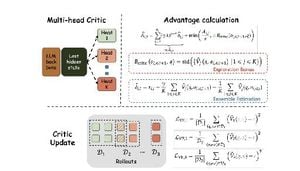Emerging technologies are transforming the way neurological disorders like Alzheimer's and Parkinson's disease are diagnosed and treated, leading the way to potentially life-changing innovations. Blood tests, long used primarily for physical ailments, are now stepping onto the cerebral stage, promising earlier diagnoses and more refined treatment pathways for some of the most challenging neurological conditions.
One significant development is the advent of blood tests for Alzheimer's disease. According to recent reports, Alzheimer's currently affects over 55 million individuals globally, with numbers expected to triple by 2050. This alarming trend has intensified the race for advanced diagnostic methods. A report from GlobalData highlights the potential of blood-based biomarker tests as reliable alternatives to traditional PET scans and cerebrospinal fluid (CSF) analyses. Not only do these tests promise speedier and less invasive diagnostic procedures, but they also hold the key to timely interventions.
Ashley Clarke, Senior Medical Analyst at GlobalData, emphasizes the importance of reliable and accessible testing for Alzheimer’s disease. She notes, "For Alzheimer’s disease, reliable and accessible testing could lead to earlier detection, giving patients more time to pursue interventions and lifestyle changes.” With over 150 blood-based biomarker tests for Alzheimer's currently under development, this innovation aims to streamline the diagnostic process and reduce the burden on healthcare systems.
Despite the enthusiasm, there are challenges to overcome. While these blood tests boast high negative predictive values, which could effectively mitigate unnecessary hospital visits, regulatory hurdles remain. The U.S. FDA has not yet granted full approval for these tests, leading to questions about their real-world impact. Ethical issues surrounding patient consent and the potential for psychological impacts from early diagnosis also loom large. These factors could affect patient trust and willingness to undergo testing.
Simultaneously, advancements are being made for Parkinson's disease diagnosis. The Delphi-MD system, developed by Quantalx Neuroscience, aims to diagnose Parkinson's disease at earlier stages using real-time imaging of brain activity. The technology identifies subtle network changes caused by the progressive dysfunction of dopaminergic neurons—the cells primarily affected by Parkinson's. Mark Hallett, MD, involved with the project, remarked, "Delphi-MD...could revolutionize how we approach treatment and patient care.” This innovative approach not only offers quick diagnoses but also may help tailor personalized treatment strategies based on individual disease progression.
Parkinson's can manifest with several different subtypes—early disease onset, tremor dominant, non-tremor dominant, and rapid disease progression without dementia. Understanding these subtypes through diagnostic tests could enable more effective treatment pathways, offering hope for those facing this debilitating condition. Researchers suggest patients identified with rapid progression might be considered for deep brain stimulation (DBS) or other experimental treatments sooner, potentially improving their quality of life significantly.
Another bleeding-edge development is the EDIT-B blood test, which refines the diagnosis of bipolar disorder. This first-of-its-kind test utilizes biomarkers related to RNA editing to differentiate bipolar disorder from depression, which is notoriously difficult to diagnose accurately. Patients often wait seven to ten years for correct classification—time filled with misdiagnoses and inappropriate treatments. Alcediag, the company behind the test, claims it can significantly shorten this timeframe. Co-founder Dinah Weissmann shared, "We have a signature for those with depression, a signature for the controls, and ... one for bipolar.” While the test has some established validity, skepticism remains from parts of the scientific community, mainly focusing on the small scale of initial trials and lack of independent verification.
The development of these blood tests is part of broader research aimed at enhancing diagnosis and treatment. Advances indicate increased plasma levels of certain amino acids correlate with improvement as patients undergo antipsychotic treatments for first-episode psychosis (FEP). The interplay of nutrition, supplementation, and careful monitoring of these biomarker levels may provide new avenues for improving therapy outcomes. Evidence shows higher levels of certain amino acids, particularly following treatment, may indicate positive responses to medications.
While promising, these breakthroughs come with caveats. The validity of tests like EDIT-B and the reliability of the data backing them are under scrutiny. Concerns include whether the tests are sensitive and specific enough to warrant use in wider clinical settings and how effectively they can operate outside of research settings. Boris Chaumette, a psychiatrist at the French National Institute of Health and Medical Research, expresses the need for larger scale studies, which would allow for more thorough validation before widespread adoption. Studies with larger, more diverse populations could provide valuable data on how these tests work across patient demographics.
Looking forward, stakeholders within the healthcare system remain cautiously optimistic about the integration of these technologies. While blood tests for neurological disorders are not yet fully accessible, the rapid pace of research and clinical trials signals meaningful progress. Experts believe these innovations could reshape both diagnostic protocols and treatment strategies, potentially leading to proactive management of disorders traditionally addressed reactively. The intersection of predictive diagnostics and personalized medicine stands poised to redefine how we approach neurological disorders.
The receptiveness of the medical community and patients will be pivotal as these tests move from the lab to the clinic. Acceptance hinges on clear communication of their potential benefits and risks. If stakeholders successfully navigate the complex web of regulatory, ethical, and practical challenges, we could soon find ourselves at the dawn of personalized healthcare for conditions historically beset by delayed diagnoses and ineffective treatments.



